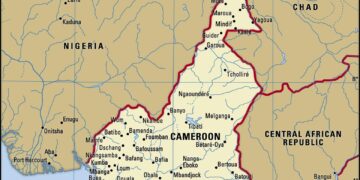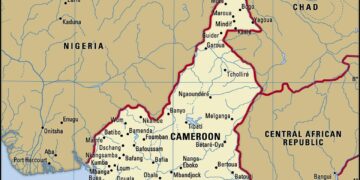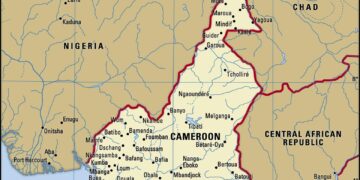Title: Violence and Intolerance: The Brutal Reality of Homophobia in Cameroon
In recent events that have garnered international outrage, two men were violently attacked by a lynch mob in Cameroon while they were allegedly engaged in sexual activity inside a car. This harrowing incident highlights the pervasive anti-LGBTQ+ sentiment in a country were homosexuality is criminalized, and societal stigma remains deeply entrenched. The attack not only underscores the tangible dangers faced by LGBTQ+ individuals in Cameroon but also raises critical questions about the broader implications of such violence on human rights and social justice. As reports of mob violence against homosexuals continue to surface, the need for dialogue and reform becomes increasingly urgent, driving activists and organizations like “Erasing 76 Crimes” to shed light on these grave injustices that propagate fear and discrimination within communities. This article seeks to contextualize this latest incident within the larger framework of homophobia in Cameroon, exploring its roots, consequences, and the growing call for change amidst a climate of fear.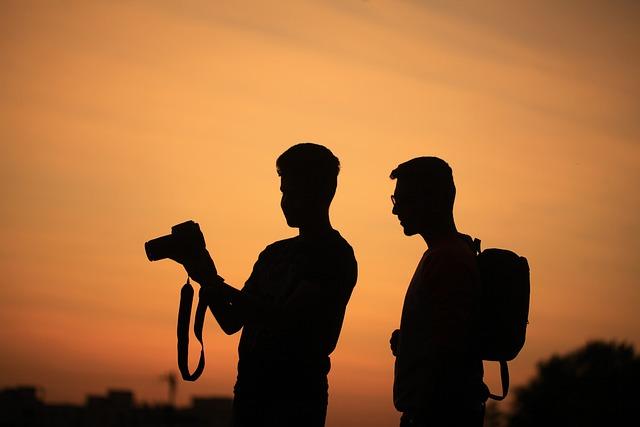
Understanding the Context of Homosexuality in Cameroon
The situation surrounding homosexuality in Cameroon is marked by a complex interplay of cultural, legal, and social factors that create a precarious environment for LGBTQ+ individuals. The country remains one of the few places in the world where same-sex relationships are criminalized,leading to persecution and violence against those perceived to be part of the LGBTQ+ community. Public attitudes are heavily influenced by traditional beliefs and religious doctrines that often stigmatize homosexuality, reinforcing an atmosphere where violence is not only tolerated but, in some cases, encouraged. This sentiment can incite fierce reactions, resulting in mob violence against individuals caught in compromising situations, as seen in recent events.
Moreover, the legal framework in Cameroon plays a notable role in perpetuating homophobia. Laws criminalizing homosexual acts are utilized to justify extreme vigilantism, with perpetrators feeling emboldened to act outside the law. Factors contributing to this opposed environment include:
- A lack of legal protection for LGBTQ+ individuals
- Societal norms that equate homosexuality with immorality
- The absence of supportive public health initiatives tailored to LGBTQ+ needs
| Aspect | Impact |
|---|---|
| Legal Status | criminalization fosters violence |
| Cultural Perception | Stigmatization and discrimination |
| Religious Influence | Reinforces negative stereotypes |
the prevailing context in Cameroon creates significant barriers for LGBTQ+ advocates and allies, inhibiting progress toward equality and safety. This cycle of violence and discrimination must be addressed through advocacy,education,and comprehensive legal reform to protect the rights and dignity of all individuals.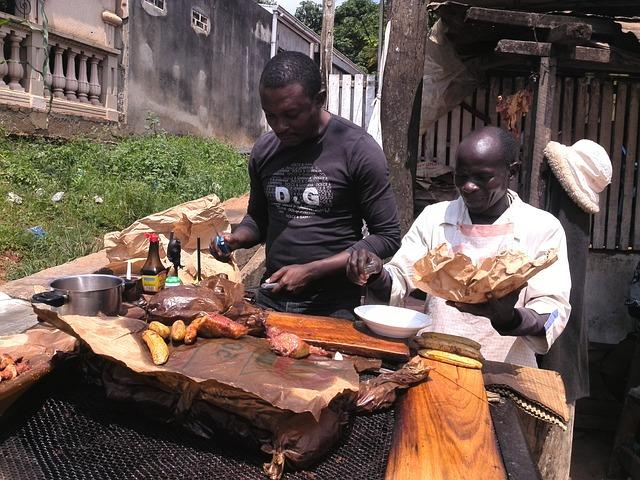
The Rise of Violence Against LGBTQ+ Individuals in Africa
The recent attack on two men in cameroon, who were violently assaulted by a lynch mob while engaging in consensual sexual activity in a car, highlights the alarming trend of rising violence against LGBTQ+ individuals in Africa. This incident is not an isolated event; rather,it reflects systemic discrimination and a culture of homophobia that is entrenched in many African societies.Factors contributing to this rise in violence include entrenched cultural beliefs, the influence of religious institutions that condemn homosexuality, and inadequate legal protections for LGBTQ+ rights. Such societal attitudes are often exacerbated by goverment policies that criminalize same-sex relationships, creating an environment where violence is not only tolerated but sometimes encouraged.
The consequences of this violence are multifaceted, inflicting both physical and psychological harm on victims while fostering an atmosphere of fear and oppression.the impact on communities can be devastating, with reports suggesting that LGBTQ+ individuals face increased discrimination in areas such as employment, healthcare, and housing. In comparison to global statistics, a stark disparity exists, exemplifying the urgency for international advocacy and support for human rights organizations working to protect vulnerable populations in Africa. Key aspects of the situation can be summarized as follows:
| Key Issues | Impact |
|---|---|
| Criminalization of homosexuality | Perpetuates violence and discrimination |
| Lack of legal protection | increased vulnerability of LGBTQ+ individuals |
| Cultural stigma | Normalizes violence against queer people |
| Inadequate support systems | Limited access to healthcare and social services |

Eyewitness Accounts: The Brutality of Mob Justice
Onlookers described the harrowing scene as a group of enraged individuals surrounded a parked car, where two men were discovered engaged in a consensual act. Witnesses recounted the palpable tension escalating into violence, with shouts of condemnation echoing in the air. The initial shock quickly transformed into a frenzy, with the assailants pulling the men from the vehicle as they hurled insults and threats. Eyewitnesses reported that fear gripped the hearts of those nearby, yet many felt powerless to intervene:
- “We just watched in horror,” a local shopkeeper remarked.
- “It felt like savage justice, not law,” another bystander added.
- “I didn’t know what to do; it was terrifying,” a nearby woman said, trembling as she recalled the event.
As the mob continued their assault, it became clear that this was not merely a spontaneous act of anger, but rather a reflection of deeply ingrained societal attitudes towards homosexuality. The brutality of the moment was accentuated by the crowd’s collective sense of righteousness, which displaced any concepts of compassion or legality. Eyewitness accounts revealed that mob mentality prevailed, as the crowd’s actions were fueled by a toxic blend of ignorance and cultural beliefs:
| Witness Account | Key Insight |
|---|---|
| local Shopkeeper | Expressed helplessness in the face of violence |
| Bystander | Described it as a form of justice devoid of law |
| Nearby Woman | Felt the terror and shock, unable to act |

Legal Implications: analyzing Anti-LGBTQ+ Laws in Cameroon
The recent incident involving a lynch mob attacking two gay men in Cameroon highlights the severe legal consequences faced by individuals who are part of the LGBTQ+ community in this West African nation. Under Cameroonian law, same-sex sexual activity is criminalized, frequently enough resulting in harsh penalties for offenders. article 347 bis of the Penal Code stipulates that anyone convicted of engaging in homosexual acts can face up to five years in prison, alongside large fines. this legislation not only perpetuates stigma but also encourages violence and discrimination against LGBTQ+ individuals, fostering an environment of fear and persecution.
Along with penal provisions, societal norms further complicate the landscape for LGBTQ+ rights in Cameroon. The criminalization of homosexuality creates a culture where vigilante justice thrives, as seen in this case where a mob felt emboldened to act violently. Factors contributing to this hostile environment include:
- Deep-rooted cultural beliefs
- Lack of legal protections against discrimination
- Influence of traditional and religious institutions
- Complicity of law enforcement agencies
These elements coalesce to create a daunting atmosphere for activists pushing for reform and recognition of LGBTQ+ rights, exacerbating the ongoing struggles faced by many in the community.

Advocacy and Support: How Can the International Community Help?
The international community plays a crucial role in addressing violence targeting marginalized groups,including the LGBTQ+ population in Cameroon. Immediate actions can include:
- Condemnation of Violence: Strong public statements from governments and international organizations can serve to denounce mob violence and human rights abuses.
- Support for Local Activists: Providing funding and resources to local LGBTQ+ organizations can empower them to advocate for change and offer support to victims.
- Diplomatic Pressure: Engaging directly with the Cameroonian government to urge the implementation of protective laws and policies for LGBTQ+ individuals.
Along with immediate actions, sustained efforts are necessary to create an environment of acceptance and safety. Consider the following long-term strategies:
| Strategy | Description |
|---|---|
| Cultural Dialogue | Facilitating conversations that challenge societal norms and promote understanding of LGBTQ+ rights. |
| Legal Reforms | Working towards decriminalizing same-sex relations and enhancing protections against discrimination. |
| Education Initiatives | Implementing programs in schools to educate young people about diversity and respect for all sexual orientations. |
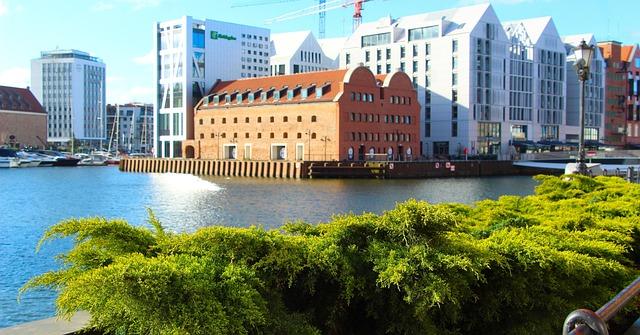
Moving Forward: Strategies for Promoting LGBTQ+ Rights in Cameroon
To foster a more inclusive environment for LGBTQ+ individuals in Cameroon, it is essential to adopt a multi-faceted approach that engages various stakeholders. Advocacy groups should focus on building alliances with local communities, religious leaders, and governmental institutions to create a dialogue around LGBTQ+ rights. Strategies might include:
- Awareness Campaigns: Launch educational initiatives that highlight the basic rights of LGBTQ+ individuals and challenge harmful stereotypes.
- Legal Advocacy: Work towards reforms in the legal system that decriminalize homosexuality and protect LGBTQ+ individuals from hate crimes.
- Community Engagement: Foster support networks through workshops and events that encourage acceptance and understanding.
Additionally, utilizing digital platforms for advocacy can magnify efforts. Social media campaigns can help amplify voices and share stories that humanize the LGBTQ+ experience in Cameroon.Key components could include:
- Storytelling Initiatives: Encourage individuals to share their experiences, creating a powerful narrative that resonates nationally.
- International Support: Engage with global NGOs to provide resources and visibility, showcasing a united front for LGBTQ+ rights.
- Safe Spaces Actions: Establish confidential support lines or shelters for those facing violence or discrimination.
| Strategy | Description |
|---|---|
| Awareness Campaigns | Educating the public on LGBTQ+ rights through workshops and media outreach. |
| Legal Advocacy | Pushing for the decriminalization of homosexuality and protection laws. |
| Community Engagement | Building acceptance through network support and community events. |
| Storytelling Initiatives | Sharing personal experiences to foster empathy and understanding. |
| International Support | Collaborating with global organizations for increased resources. |
| Safe Spaces Actions | Creating refuge for victims of discrimination and violence. |
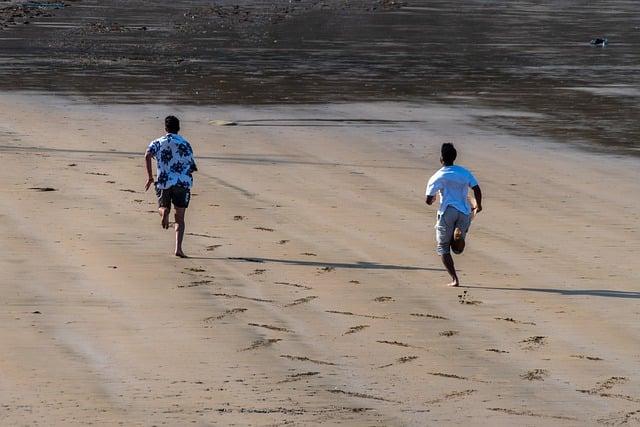
Closing Remarks
the tragic incident involving the lynch mob attack on two gay men in Cameroon highlights the persistent dangers faced by LGBTQ+ individuals in regions where homosexuality is criminalized and social stigmas prevail.This brutal event underscores the urgent need for advocacy and reform within legal frameworks to protect human rights for all citizens, nonetheless of their sexual orientation. As communities worldwide grapple with issues of acceptance and equality, it is indeed crucial to shine a light on such incidents to foster understanding and compassion. The ongoing fight against discrimination and violence requires not only awareness but also collective action to ensure that such atrocities are condemned and eradicated. In the words of human rights advocates, the pursuit of justice for marginalized groups remains essential in fostering a more equitable society.


